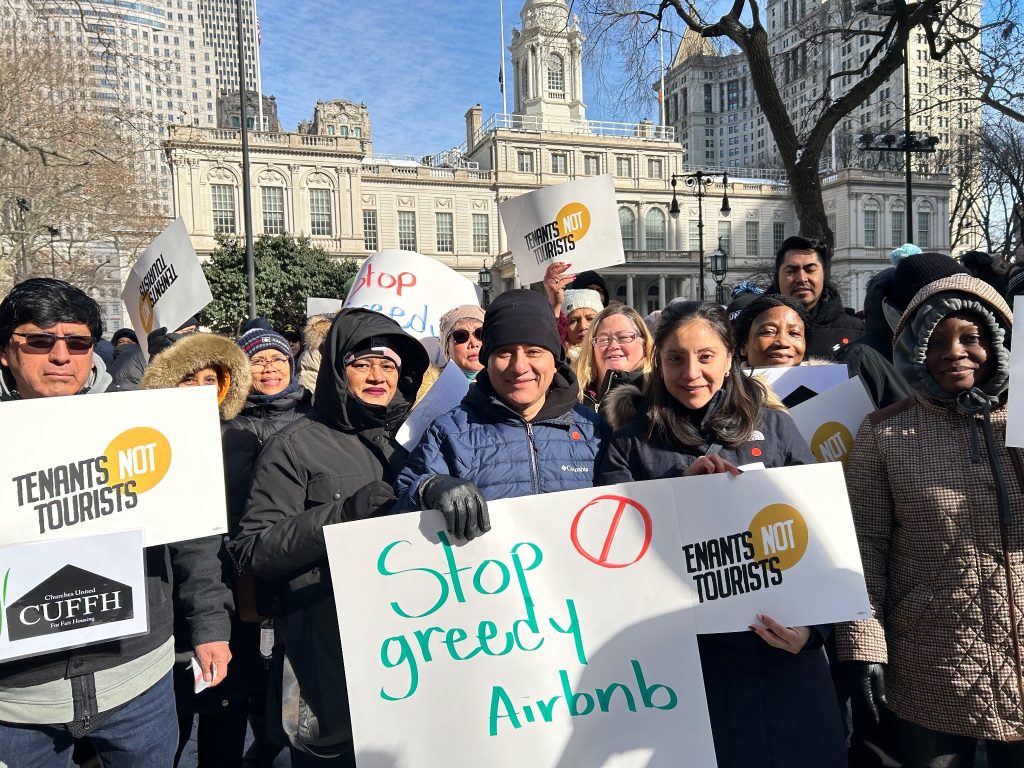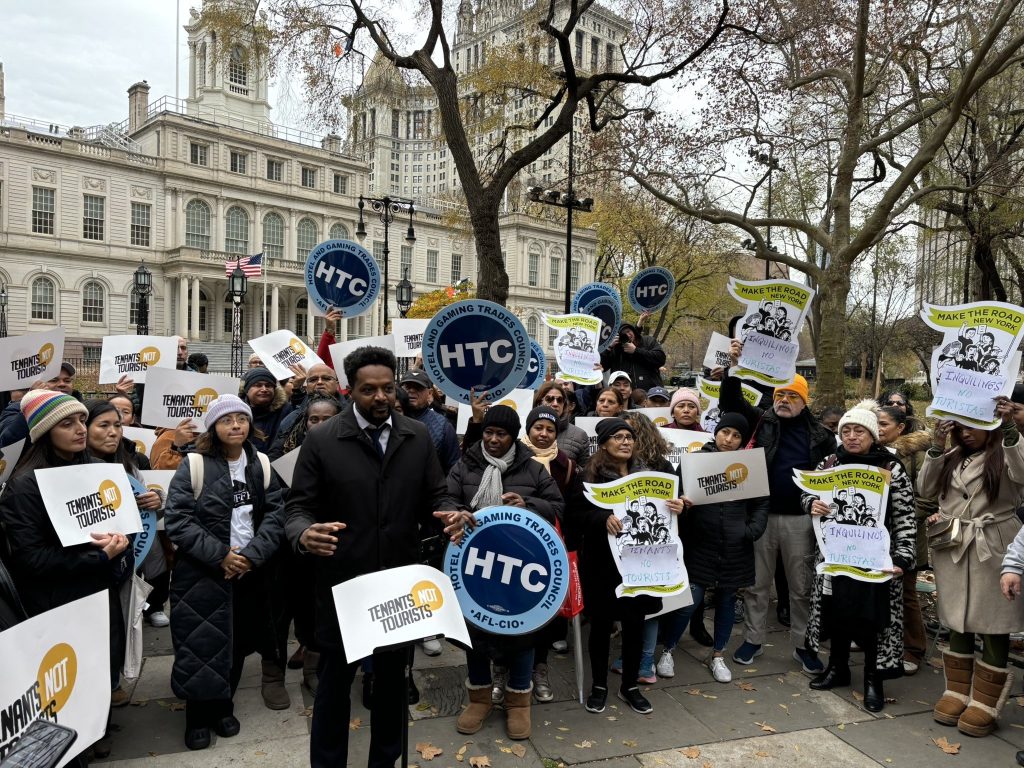
Courtesy Tenants Not Tourists
By MOHAMED FARGHALY
mfarghaly@queensledger.com
A new coalition of housing advocates, Tenants Not Tourists, has emerged in New
York City to oppose a controversial bill that they argue would worsen the city’s
ongoing housing crisis. Launched in December, the coalition includes 43
organizations, ranging from tenant groups and unions to churches and human rights
advocates, all united in their opposition to Intro 1107. This piece of legislation,
currently under consideration by the New York City Council, has garnered support
from Airbnb and aims to allow short-term rentals in one- and two-family homes.
Critics argue that this could turn residential properties into tourist
accommodations, further exacerbating the city’s already severe housing shortage.
The coalition warns that allowing more short-term rentals would result in
thousands of homes being taken off the rental market, driving up rents and
intensifying the affordability crisis in New York City. This shift, they say, would also
undercut the progress made by Local Law 18 of 2022, which was designed to
regulate short-term rentals (STRs) and ensure that housing remains available for
long-term residents. Under the current law, only homeowners who live on the
property are allowed to rent out their homes for short-term stays. However, the
proposed bill would eliminate this key provision, potentially enabling landlords to
lease properties to tourists without even being present, leading to unchecked
growth in short-term rentals.
“New York City cannot afford to lose any more homes,” echoed the coalition. They
argue that while proponents of the bill claim it would benefit homeowners, it would
instead encourage real estate speculation and drive-up housing costs, ultimately
displacing long-term residents. Moreover, the coalition asserts that allowing short-
term rentals in these neighborhoods would not only hurt tenants but also expose
homeowners to greater risks, particularly those in vulnerable financial positions. As
the city faces a growing foreclosure crisis, advocates warn that the bill does little to
address these underlying problems.

The coalition also highlights the broader impact of the bill, particularly how it would
benefit large investors and private equity firms. These firms have increasingly been
buying up properties in New York, including one- and two-family homes, flipping
them into short-term rentals or reselling them for profit.
Whitney Hu, a coalition member from Churches United for Fair Housing, pointed out
that this trend disproportionately harms communities of color, where private equity
firms exploit the lack of regulations to make significant profits.
“You’re competing against Wall Street in the housing market,” said Hu. “For many
residents, there’s no way to win when these large investors are in the game.”
While the bill would make it easier for landlords to convert units into short-term
rentals, critics argue that this could also lead to entire buildings being turned into
transient accommodations, as has already been seen in some neighborhoods.
“We’ve seen entire buildings turned into Airbnbs,” Hu said, emphasizing how these
properties, originally meant to be stable homes for families, have instead been
transformed into sources of short-term profit. This shift, she argues, undermines the
integrity of local communities, creating an unstable and transient population, rather
than one with deep, long-term roots in their neighborhoods.
“This bill aims to fix an overly restrictive short-term rental law that, in the last year, has failed to decrease rents in NYC and only increased hotel rates exorbitantly for travelers,” Nathan Rotman, Director of Policy at Airbnb. “The bill makes common sense and marginal updates to the existing law by allowing one- and two family homeowners in New Yorkers to share their primary homes and yet, the big hotel chains are using scare tactics to exploit one of the biggest social challenges of our time to boost their profits with sky high nightly rates – it’s time to fix a broken law that hasn’t helped housing but has padded hotel industry pockets at everyone else’s expense.”
Although Local Law 18 of 2022 marked a step forward in regulating short-term
rentals, Hu expressed concern that efforts by companies like Airbnb to push for
legislative carve-outs could weaken enforcement of these protections. She argued
that any attempt to roll back these laws would set a dangerous precedent,
particularly in neighborhoods already experiencing high levels of displacement due
to gentrification and market pressures.
In addition to concerns about short-term rentals, Hu emphasized another key issue
facing New York City’s housing market: the growing influence of private equity in
purchasing properties. Many of these firms have been buying up one- and two-
family homes and converting them into short-term rental units, further driving up
rents and making housing less affordable for long-term residents. According to Hu,
these private equity firms are exacerbating the housing crisis by speculating on real
estate, driving prices up, and pushing local residents out of their communities.
Despite these challenges, Hu and her colleagues maintain that there are alternative
solutions that can address the housing crisis without opening the door to more
short-term rentals. One such solution, proposed by New York City Comptroller Brad
Lander, involves creating a city-run home-sharing platform that would allow
homeowners to rent out their properties in compliance with state law. Hu explained
that such a platform would offer a more regulated and equitable way to connect
homeowners with renters, ensuring that the housing market remains stable and fair.
“This would be a much more sustainable option, one that pairs New Yorkers with
homeowners in a way that falls within the law,” she said.
Advocates are also pushing for other forms of financial relief for homeowners, such
as mortgage assistance, that would allow them to stay in their homes without
resorting to short-term rentals. Hu stressed that it is essential for policymakers to
find solutions that balance the needs of both homeowners and renters, especially
given that the majority of New Yorkers are tenants.
On January 23, Tenants Not Tourists, a coalition of housing advocates, tenant groups,
labor organizations, and New York City renters, rallied outside City Hall with
prominent figures such as NYC Councilmembers, Comptroller Brad Lander,
Assembly Members Zohran Mamdani and
Harvey Epstein, and others to demand the rejection of Intro 1107.
“Rolling back the strongest Airbnb protections in the country will not solve the
affordable housing crisis that is pushing New Yorkers out of the city,” said New York
City Comptroller Brad Lander at the rally. “Homeowners are also feeling the crunch,
but that doesn’t mean we should put the burden back on renters through prices
New Yorkers can’t afford. We need to look to other models for shared living to
connect homeowners with spare rooms with renters in a way that ensures
transparency and accountability while truly alleviating the housing crisis.”

The coalition shared a letter signed by 43 housing and tenant rights organizations,
urging Council Speaker Adrienne Adams and Housing Chair Pierina Ana Sanchez to
stand with the majority of struggling New Yorkers and reject Airbnb’s efforts to
undermine the housing market. At the rally, Darius Gordon, Executive Director of
the Met Council on Housing, emphasized that passing the bill would incentivize
private equity buy-ups, allowing landlords to take homes off the rental market,
further exacerbating the housing shortage and driving up rents.
“The City Council has promised to address our historic housing crisis and provide
stable, affordable homes, but it cannot do that by passing legislation that would pull
the rug out from under tenants and roll back regulations on our housing supply.
Airbnb’s bill would create loopholes that incentivize private equity buy-ups and
allow landlords to take thousands of homes off the rental market, driving rents up
and making our housing shortage even worse. We’re not going to let Airbnb and
other real estate vultures use our homes for profit without a fight, which is why
we’re urging the Council not to take their bait and reject this dangerous bill,” said
Gordon.
“It’s important to ask who is funding this alleged tenants group that has the funds necessary to buy television advertising and whose bottom line those funders are working to protect. This is clearly about protecting the rising prices Hotels are charging in New York City, not about tenants,” Rotman said.
As the debate continues, Tenants Not Tourists is urging New Yorkers to take action
by contacting their local council members and expressing their opposition to the
bill. They have also created a platform on their website, tenantsnottourists.com,
where residents can join the fight by filling out a form to get involved.


